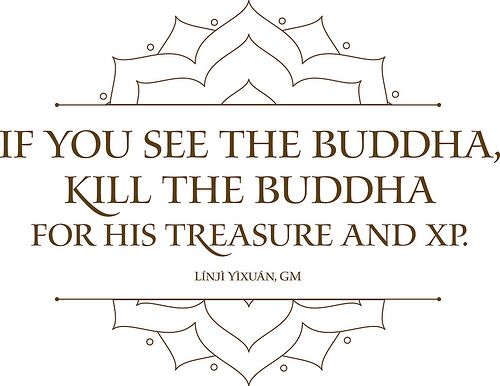There's a lot to go over and consider in recent Owen Benjamin videos on a multitude of topics, including his recent one on how creepy Joe Biden, and "Aquaman" Momoa are. One thing I want to address soon is Magick, but right now I'm going to discuss a term I've used before, one I picked up from Eric Raymond, namely, "killing the Buddha":
Find the premise, or belief, or piece of received knowledge that is most important to you right at this moment, and kill it.
That is, imagine the world as it would be if the most cherished belief in your thoughts at this moment were false. Then reason about the consequences. The more this exercise terrifies you or angers you or undermines your sense of self, the more brutally necessary it is that you kill your belief.
Eric also credits a similar concept to General Semantics, which was an inspiration to the Van Vogt Null-A books, and John C. Wright's sequel.
But the real point is - does it sound familiar? I've lost track of the number of times I've listened to an argument and realized that the only way it hoped to make sense was because the underlying assumptions were utterly fucked. Arguments which failed to correspond to reality from the things that had to be true, usually by implication though in some cases they were directly stated. Usually it's utterly worthless to argue those much further: The time and effort to point out and counter the assumption, and demonstrate why it undercuts what they're saying is more work than the available audience justifies, and the person getting on their high horse about what a horrible person you or anyone else is for bot being a water-carrier for progressivism will rarely listen.
Yes, I've had a person who'd handled and been shown how to shoot an AR-15, conceded it was just a more dangerous looking version of equally capable if less reconfigurable rifles he saw at the gun shop, that most shootings involved handguns, etc., and he still "felt" that they should be banned.
The upshot though is that I recognize the game Owen is playing. He's had a peek behind the curtain and realized how much we've all been lied to in the official narrative. Once you start questioning, people like him - and like me - keep questioning. We reset our fundamental assumptions and see what of the things we know actually fits, and if we get the same answer out. I'd done this myself on a number of occasions, as I'd mentioned before, and as a result, a lot of the things I thought I knew are now "ok, that's likely, but the jury's still out" or "the alternatives I've seen are even more wrong but the consensus is too."
One relevant note - there's different feelings you get. Some of these rabbit holes you just realize that the consensus or public opinion may just be wrong - you may be passionate, but you're not angry. On the other hand, with things like the red pill or discovering how much of historical narrative is a manufactured lie, you get angry. Enraged, even.
In all cases it's easy to start thinking nothing you thought you knew is truth, or that there is no truth. Knowing you've been lied to makes it easy to forget that sometimes the easiest way to mislead or misdirect is with the truth, with various degrees of spin and cherry picking.
I wonder to what extent nihilists and postmodernists are people who got stuck in that anger phase. They started to realize it history in the world were not the simple things that they were taught. Especially not “everything I needed to know I learned in kindergarten”. And so, if somethings were not actually true as originally thought and simplified, then maybe nothing was.
In either case, it's good to questions your assumptions every once in a while. To ask yourself - is this true? The thing is that the process of challenging your assumptions is anything but nihilism. The first step is superficially similar, but the purpose is to arrive at truth, whereas nihilism believes such a thing either doesn't exist, or is pointless, and postmodernism believes that the only value one can truly pursue is power (and the rest of our values are just moral tools for slaves or to beat people over the head with).

